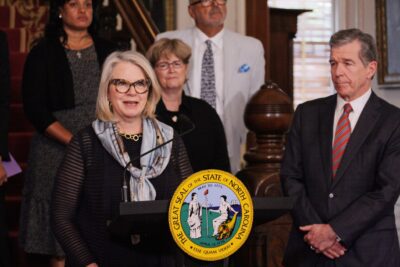
The UNC Board of Governor’s Committee on University Governance voted unanimously — and without discussion — on Wednesday to repeal and replace the UNC System’s current diversity, equity, and inclusion (DEI) policy.
The Board’s proposed policy, among other things, would eliminate system-wide DEI metrics and goals across the UNC System, along with the requirement for schools to appoint a senior-level DEI officer.
The policy will go before the full Board of Governors on its consent agenda in May. It is effective upon its adoption, the draft document says.
“The University of North Carolina reaffirms its longstanding commitment to the equality of opportunity in education and employment as a core value,” the Board’s agenda item says. “As such, the University continues to ensure that diverse persons of any background, from North Carolina and beyond, are invited, included, and treated equally.”
The UNC System is made up of 17 institutions — 16 public universities and a public boarding high school, the North Carolina School of Science and Mathematics — that serve nearly 250,000 students each year. This decision could have ripple effects on other institutions of education from K-12 to community colleges as well as issues from the preparation of educators to the chilling of the talent pool.
The new policy would require that each institution certify by Sept. 1 that it “fully complies with the University’s commitment to institutional neutrality and nondiscrimination.” That reporting deadline includes each school eliminating or updating its current DEI positions.
The new policy proposal also states that “diversity means the ways in which individuals vary, including, but not limited to, backgrounds, beliefs, viewpoints, abilities, cultures, and traditions that distinguish one individual from another.”
Members of the UNC System Board of Governors, who are appointed by the state legislature, oversee the entire system. Republicans have maintained control of the state legislature for the last decade, and there is only one registered Democrat on the Board of Governors.
The Board of Governors then controls appointments to the individual universities’ boards of trustees as well as chancellors and presidents. You can view a list of the Board’s 24 voting members here.
WRAL reported that House Speaker Tim Moore, R-Cleveland, said last week that lawmakers would allow universities to tackle the issue first. Moore is not running for re-election for his state seat in 2024.
Already, last June, North Carolina Republicans passed Session Law 2023-62, “an act to amend the State Human Resources Act to prohibit compelled speech when an individual seeks state government or community college employment.”
That ban on “compelled speech” in hiring and admissions decisions has since impacted diversity efforts in faculty hiring and evaluation, the News & Observer reported in July.
You can view the new policy proposal, “Equality Within the University of North Carolina,” starting on page 7 of the Board’s agenda.
You can also view the UNC’s System’s current policy, Regulation on Diversity and Inclusion Within the University of North Carolina, which was adopted in 2019.
What does the new policy say?
The proposed policy includes 10 sections.
First, the policy states its purpose.
The law of North Carolina defines “The University of North Carolina [as] a public, multicampus university dedicated to the service of North Carolina and its people.” Its mission prescribed by law is to “discover, create, transmit, and apply knowledge to address the needs of individuals and society.” G.S. 116-1. Accomplishing the former—addressing the needs of individuals—requires that each be treated as an individual deserving of dignity and inclusion.
Excerpt from proposed UNC System policy
Next, the policy outlines the system’s nondiscrimination in employment practices and educational programs and activities. The policy states that the system “shall continue to comply with federal and state law prohibiting discrimination and harassment of members of protected classes.”
Here’s a quick look at the other sections:
- Ensuring Equality of All Persons & Viewpoints: This section further extends the nondiscrimination requirements for state government workplaces outlined in state statute (G.S. 126 14.6) to university-led student orientations, training, or activities.
- Commitment to the Freedom of Speech & Expression: “…the University of North Carolina shall continue its proud tradition of pursuing and embracing the most vigorous, open, and thoughtful exchange of ideas.”
- Maintaining Academic Freedom: The policy says the system “shall take no action that would limit the right of academic freedom in its faculty’s pursuit of teaching, research, and service, subject only to the institutional tenure policies.”
- Commitment to Student Success & Employee Well-being: “Campuses shall continue to implement programming or services designed to have a positive effect on the academic performance, retention, or graduation of students from different backgrounds, provided that programming complies with the institutional neutrality specified in Section VII of this policy and/or other state and federal requirements.”
- Maintaining Institutional Neutrality: “…No employing subdivision or employment position within the University shall be organized, be operated, speak on behalf of the University, or contract with third parties to provide training or consulting services regarding: matters of contemporary political debate or social action.”
The policy’s Sept. 1 report requirement also requires campus leaders to submit “a report on reductions in force and spending, along with changes to job titles and position descriptions, undertaken as a result of implementing this policy and how those savings achieved from these actions can be redirected to initiatives related to student success and wellbeing.”
Finally, the policy says student-led organizations “may use university facilities and receive student activity funding notwithstanding any speech or expressive activity by such organizations that would otherwise violate” the policy’s section on maintaining institutional neutrality.
What was repealed?
The current policy, in place since 2019, “sets forth procedures related to the oversight of D&I activities and related reporting to monitor the effectiveness of these efforts.”
Here is a look at the major requirements laid out in that policy:
- The designation of a senior officer at the UNC System Office to serve as DEI liaison to UNC System campuses.
- The appointment of a senior-level DEI officer at each constituent institution. This officer will assist the chancellor in DEI policy development, oversee DEI work, and advise on trainings and outreach, among other things.
- The establishment of of a UNC System Diversity and Inclusion Council to develop system-wide DEI goals and metrics and share best practices.
- The dissemination of DEI information to students and employees.
Read the full policy here.
Efforts to reform UNC governance
Last summer, the Governor’s Commission on Public University Governance announced its recommendations for strengthening the UNC System, including the creation of a Center of Higher Education Governance, a larger system governance board, and changes to term lengths for board members, among other things.
Democratic Gov. Roy Cooper announced the commission on Nov. 1, citing signs of undue political influence and bureaucratic meddling among university governance in the state.
The 15-member bipartisan commission, co-chaired by former UNC System leaders Tom Ross and Margaret Spellings, spent the following eight months studying board governance and appointment methods. From February to April, the commission also hosted six public listening sessions across the state to gather stakeholder input on improving public university governance.
“The Commission’s recommendations are motivated primarily by the principle that the governing boards of the UNC System and its institutions should reflect, represent and be accountable to the people they serve,” the report says. “While our state is rich in all types of diversity, that diversity and that strength is not reflected in our governance today in the manner contemplated by existing state law.”
Here is a link to the final report of recommendations. You can read the recommendations on page i-iv.
On Wednesday, Cooper released a statement with Ross speaking out against the Board’s move to abolish DEI positions and initiatives across the system.
“Our diversity should be used to highlight our state’s strengths, not our political divisions,” Cooper said. “Republican legislative and university leaders who attack diversity at our public universities are failing in their duty to protect students while threatening our ability to recruit top scientists, researchers and innovators who power our economy.”
Ross said the bipartisan commission “found that a lack of diversity among university leadership and governance boards is both a disservice to students across the UNC System and leads to the controversy and volatility that we are seeing threaten our public universities.”
“Our universities should encourage diversity on their campuses and governance boards and have leaders, administrators, faculty and staff that reflect the extraordinary diversity of our amazing state,” Ross said.


